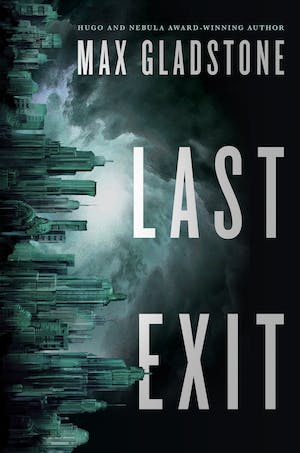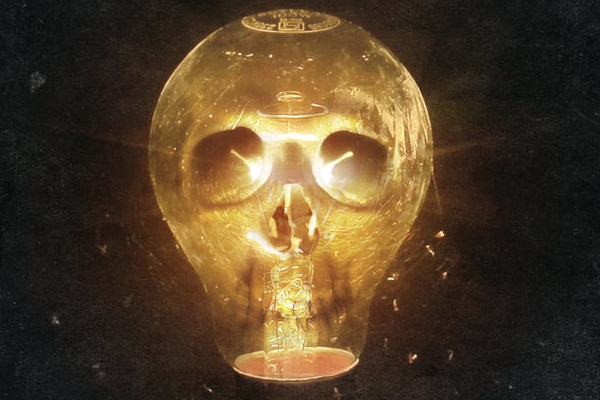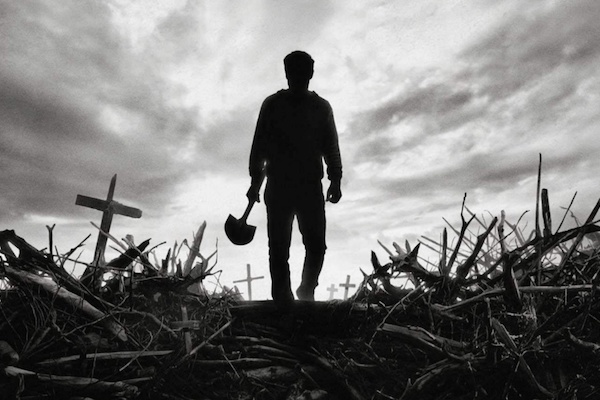Welcome back to Reading the Weird, in which we get girl cooties all over weird fiction, cosmic horror, and Lovecraftiana—from its historical roots through its most recent branches. This week, we continue Max Gladstone’s Last Exit with Chapters 3-4. The novel was first published in 2022. Spoilers ahead! (Content warning: anthropophagous insects.)
“Chased three times by dinosaurs, countless times by subhuman irradiated mutant weirdos, by robots, by the rulers of the Green Glass City, and that one time by the Gun Cult on Meriammne’s World. But they had been kids back then.”
Zelda starts alone on her trek across country, but June pursues her. Zelda’s not to blame for Sal’s disappearance, she says—“Sal always did what she wanted.” So, Zelda thinks, does Sal’s cousin. She agrees to return to Ma Tempest’s apartment after being assured Ma’s out; the least June can do to repay Zelda for saving her life is to provide shower and laundry. The place is as Zelda remembers it: full of carved wooden statues, the smell of drying herbs and other “bits of power.” Showering, she’s flooded by memories of her “ten years of free fall” since losing Sal, and by older memories of “a few kids in an old car who thought they could change the future if only they wanted hard enough.” Now she knows the “magic was a slow sort of suicide…You pushed on that gap between the way the world was and the way the world could be, until… one day the gap grew teeth and opened its mouth and ate you.”
In the kitchen, June makes Zelda one of Ma’s teas, then states she’s coming with Zelda. She loved Sal, too, and maybe they can get her back. Zelda refuses. June has to understand that where Sal is, “Time goes forward and backward at once. Everything shifts into everything else. You can’t depend on any truth. Just power and pain.” Sal can’t be, or become again, the cousin June knew.
June is adamant: She’s coming, and if Zelda tries to skip out, she’ll chase her across the whole country. Zelda gives in, maybe. She sends June to shower while she writes out a packing list. Some June will have to shop for, which reawakens the girl’s suspicions; nevertheless she leaves Zelda alone in the apartment. In Sal’s old room, now June’s, Zelda finds June’s sketches: “bold, swift, drawn with a hunger for shape and shade.” One shows Zelda and Sal, “two women in love, at ease…as June must have seen them or remembered them.” But this Zelda and Sal exist in a fictional world where problems are fixed by talking them out. June thinks going to save Sal and the world will be an adventure She thinks there’s something left to save.
Zelda takes the sketch and stashes it in her jacket. For all she craves a companion, she won’t drag June into the same mess that took Sal. June “deserved her own life, not the echo of her cousin’s.”
She climbs down the fire escape and heads for the subway. A supplies-laden June spots her and gives chase. She catches up with Zelda on the subway platform; good alternatives exhausted, Zelda jumps onto the tracks and sprints toward the approaching train. Almost she wants this to be her end, but it’d be too easy. Just before collision, Zelda’s spin deposits her in an undercity space paved with skeletons.
This alt New York has seen a cataclysm Zelda can’t classify, for all her experience with ends of the world. Flashlight in hand, she picks her way through the charnel-house tunnel, trying to find a “soft place” to slip back to her world’s Penn Station and catch the train to her stashed Subaru.
Something scurries in the dark. Did rats strip these skeletons bare, or something worse? When wetness touches her cheek, Zelda panics and falls, damaging the flashlight. As the scurrying grows closer, she struggles to find it. When it finally clicks on, she sees the tunnel ceiling studded with jewels. Then the jewels start boiling away from her light and dropping to the tracks. One lands on her wrist: A half-dollar-sized beetle with iridescent carapace, sinking mandibles into her arm. The pain burns; when she dashes the creature off, blood flows. Its million fellows pursue Zelda, held off only by her flashlight beam.
So of course her flashlight fails. Luckily she’s reached a ruined station with a skylight—in its illumination, she’ll be safe until the sun moves on. Beetles block her way to a winding staircase and escape. Zelda rigs a reflector from her foil blanket and human bones, casting a light-path to the staircase. She’ll survive once again, and more than survive: Forget mending rot-cracks—she’ll face the beast that took Sal, she’ll spend all her spin and blood to beat it. She’ll demand answers and get them, or she’ll die.
She climbs the staircase in darkness, protected by a metal cage the beetles can’t squeeze through. Then she hears footsteps behind her, and someone whistling “The Impossible Dream,” exactly as Sal used to whistle it.
It’s too soon to face the Sal-beast. Coming to a metal door, Zelda throws all her remaining spin to burst through into a subway station in her own world. She doctors her wounds, then heads for Penn Station. Finally safe on the train south, she allows herself to drop toward sleep.
Someone sits next to her. June asks, “So, what’s next?”
A Universe Full of Teeth: Magic means pushing on gaps in reality until they turn into mouths and chew you up. (Also wanting to chew you up: genetically engineered beetles, which don’t even require fangs to do so.)
The Degenerate Dutch: Ma Tempest’s place is full of “cigar store Indian stuff”. Fellowship member Sarah, actually indigenous, never said what she thought of it.
Libronomicon: Fellowship member Ramón explained the X-Men as an allegory for political change; the “fighting for a world that hates and fears us” set-up undermines any claim that peaceful coexistence is possible. The premise inherently makes Magneto right.
Anne’s Commentary
Gladstone takes advantage of two ever-reliable tropes in his opening chapters. First: If a character falls into a chasm or vortex of any sort, to fall into which is certain death, AND their body is not recovered or recoverable, that character is NOT DEAD. Peter Jackson uses this trope with joyous abandon in the Lord of the Rings movies. It’s canon that Gandalf falls into the deepest pit of Moria to return when needed most. Not canon: Aragorn falls into a river gulch and Gollum falls into a mountain rift, to return when needed most and least, respectively. Famously, Sherlock Holmes falls with Moriarty into Reichenbach Falls (“The Final Problem”), returning when fans badger Conan Doyle sufficiently (“The Adventure of the Empty House.”) When Preston and Child chucked Pendergast’s evil brother Diogenes into an active volcano, I trusted he’d resurface before long.
A subtrope of FALLS BUT ISN’T DEAD is that the fallen character returns significantly changed. This is true of Gandalf, not so much Holmes or Diogenes. Gladstone’s Sal falls into the vortex where worlds meet, into a sort of Azathothian void where the angles are wrong. Zelda differs from most FALL witnesses; though Sal seems unrecoverable, Zelda knows she’s not dead. She’s gone. Lost. Then she isn’t, because Sal’s come back CHANGED.
Sal always was an advocate for BIG CHANGE, but expected that CHANGE to be for the world’s betterment. They would right the wrongs and heal the wounds. Returned, Sal’s even more for BIG CHANGE, only, sorry-not-sorry, that requires the destruction of her former world.
Ever-Reliable Trope Two: EVERY HERO NEEDS A SIDEKICK AND/OR A PACK. The Incredibles plays masterfully with this one. Mr. Incredible starts out adamant about working alone. He rejects young inventor-prodigy Buddy, who wants to join him as Incrediboy. It’s a big mistake, since the frustrated Buddy turns to supervillainy. Luckily Mr. I has a built-in pack in his super-powered wife and kids. He just has to learn to work with a team.
Zelda started out with a team, a tight-knit quintet of college-mates determined not just to talk about saving the world but to weird-science that salvation with an epic interdimensional roadtrip. The alt-riders mirror Ramon’s vision of his beloved X-Men: Professor X and his students are social justice warriors versus a world of prejudice, but if they achieve their assimilationist goal, their comic book world will end. So however many times the X-Men save the world, the world’s only temporarily grateful. Then it’s back to other-hatred for most “normals.” Is Magneto right? Is the only solution using mutant power to rule the enemy? Is the core of existence really the “power and pain” that rule Gladstone’s beyond-space?
That’s certainly Zelda’s interpretation of the beyond. Sal Changed sees it as beautiful. So, momentarily, does June. June, unlike Zelda, has glimpsed the beyond; Sal has lived (?) there for ten years, or ten million years, or no years at all, given the slippery nature of beyond-time.
Zelda dreads and yearns to see the beyond for herself. Her flashback in Sal’s old room, the bondage-domination scene, may darkly illuminate much. Pain and power, submission and pleasure, being restrained and being held together, are complexly linked in Zelda’s psyche. That Sal can deal with this complexity, assuring Zelda that her desires are okay, proves she could be Zelda’s ideal partner.
Theirs may be Pangloss’s “best of all possible worlds,” however much it disturbs June. So what if our world hosts injustices and calamities out the butt? You should see what’s next door.
Which, in Zelda’s train-avoiding spin leap, is a subway populated by skeletons and the beetles that gnawed them, and not after death either like the dermestid beetles who obligingly clean specimens for taxidermists and natural history collections. This alt scenario reminds me of Lovecraft’s “Rats in the Walls,” in which it’s rodents who end the De la Poer’s degraded world, leaving osseous heaps in their wake. We can’t blame the beetles. They’re just doing as programmed, though not by evolution. These monsters bear logos. Someone made them, through genetic manipulation or biomechanical enhancement or both. Were they designed to control another scourge and, that scourge exterminated, turned to other prey? Were they created as a genocidal weapon? Zelda being Zelda, she assumes the latter.
Back to Ever-Reliable Trope Two. Having lost her lover, rejected by her pack, Zelda’s run as a lone wolf for ten years. She’s past due for a sidekick, a companion, an apprentice in alt-spanning magic. I wondered at the end of Chapter Two whether Goldstone would build up June only as a near-deathspian; whether he’d let Zelda walk away from such a potential Girl Wonder. I doubted he’d waste so promising a character, and Chapters 3-4 dispelled my anxiety. June’s not Sal, but she shares Sal’s crucial qualities of passion, determination and book- and street-smarts.
The girl runs like a cheetah, draws with skill and heart, has that edge of combined skepticism and conviction necessary to an alt-rider, and…
She has the foresight to scrounge through Zelda’s backpack for clues to her next destination.
I like this one.
Ruthanna’s Commentary
Entophobes beware, this week’s selection will justify your fears. Swarms of beetles, eager to devour every living thing that strays from the light! Painfully! Poisonously! What have they been feeding on while waiting for wayward interdimensional travelers? Why haven’t they all eaten each other by now, or died of starvation? Maybe ask the corporation whose distorted logo graces their carapaces. They were a terrifically innovative method of waste disposal: they’ll eat anything, it’s just that (oops) they’re particularly fond of human flesh. “Haven’t you seen Jurassic Park?”
The beetles, Chrichtonishly vivid as they are, aren’t actually the point. Zelda’s self-imposed isolation and pseudo-heroic personal responsibility are the point. Her willingness to play interdimensional chicken with trains in order to avoid “innocent” companionship is the point. As she admits later, it’s all the sort of egotistical bullshit that only comes from hating yourself. When you’re trying to save the world, you can’t afford to turn down help—because it’s not actually about you, it’s about the world. Which needs as many fighters as it can get.
June, fortunately, has both wit and tenacity for that fight, no matter how hard Zelda works to shake her. Flip ahead one page into the next chapter, and you’ll find that she sensibly failed to trust Zelda’s promises and stole a look at her train ticket. Practical except when it comes to sheer stubbornness; I like her! And Zelda needs a companion who isn’t yet quite so jaded, even if the road will be as hard on said companion as on everyone else.
Again, saving the world is more important than the cost to the savers. There’s a reason Zelda keeps thinking of Lord of the Rings—and it isn’t the pragmatic guidance on how to Mario Kondo your rope. We’ve got a lot of walking between us and Mordor, with a lot of temptation to wear us down along the way, and probably no easy homecoming at the end. The journey changes you, not always for the better, and it has to happen anyway because the alternative is worse. And you won’t make it to Mount Doom alone.
The rope is still important, of course. The journey has deep themes and also a packing list: fast-drying clothes, soap, pocketknife, toothbrush, water filter, first aid kit, sewing kit, lighter and lint, sleeping bag, ziplocks, compass, razor, map. And things to write with, read, and scry. A good inventory for anyone’s go-bag, however often you go. You’ll be clean-ish and clothed, with ways to get lost and ways to get found.
Zelda’s used to making decisions on her own, on a whim. She answers June’s questions and regrets it, shows off her magic and excoriates herself for the risk, offers the packing list and then runs out when she glimpses June’s memory of her youthful self. Her reality is spin: uncertainty, worlds that might have been and perhaps were, somewhere or somewhen. Yet she sees the portrait of herself and Sal, young and in love, as revisionist history equivalent to the claim that the U.S. Civil War had nothing to do with slavery. As if any picture that doesn’t show all her fear and confusion isn’t merely incomplete, but a lie. As if capturing a moment of public affection, rather than private pain and lust, negates any argument for letting June see what lies under the surface.
Lord of the Rings is, inevitably, a story about British journeys and wars and failures and change. Here, we are reminded repeatedly, is an American one. The examples of revisionist history and modern apocalypse and urban sewer legend are all American; Zelda and June talk about the rot in “this country” even as the Rot comes for the whole world. And after all, the road trip novel is a quintessentially American literary form. There’s as much paradox in these choices as in Zelda’s own self-focus. Writing a book from the U.S.’s last decade-ish of horrors is a reasonable and necessary cry of anguish—and yet, fascism and climate change and late-stage capitalism are not confined to national borders. What comes for America comes for the whole world, no more our national apocalypse than Zelda’s personal one—and we can’t fight effectively until we admit that.
As I suspect this book will ultimately force Zelda, and the reader, to confront.
Next week, join us for some vintage vampire beach reading, in E. Marion Crawford’s “For the Blood is the Life.”














I very much liked Zelda’s reaction to the sketch. There’s always a difference between the view of a relationship from the outside, and the internal as-lived experience of the relationship. The latter is inevitably more complex and in this case far different from the pastoral external view. The gentle togetherness of Sal and Zelda as viewed by June does not equate to Zelda’s experience becoming herself, being away from the strictures of a conservative home town, but wanting to find a stepping stone from that place to where she’s going.
@1 Well said! The tenderness and verve of Gladstone’s writing while Zelda was thinking back to her moments with Sal is really making this book for me. Zelda’s need to keep running make sense when these memories, this lost alternative life, are the things she’s trying to get away from. I wonder if part of her is hoping someday one of these alts will be a world where they got that cabin and allowed themselves to live.
I was really struck by the line, “She’d not understood this about magic, back when she started to look for some: magic was a slow sort of suicide.” It reminded me of another magician sliding by on the synchronicity superhighway – John Constantine. He was like Zelda and the gang once: young and full of wonder at the power they’ve discovered and the danger they’re able to skirt. Until that one time. Until the crossroads. Until Newcastle. And the rest of life is making up or running away from that moment. Except Zelda knows how to drive, though someone else went off with the Supernatural muscle car. Not to say this feels in any way derivative. Rather, this book feels like the 10-years-on reunion if a show, when the stakes start to really matter. More please!
@2 That is such a powerful paragraph, intensely angry. The parallel I draw to it is closer to The Magicians (either book or screenplays — both have the same through-line here). Quentin frequently despairs “what good is magic if you can’t actually fix anything?” Zelda & Co. want to make a world where kids aren’t killed by cops (and other travesties), but it seems to me that by utilizing spin and searching alternative worlds, they’re trying to find an external answer for an internal problem. Magic cannot actually fix this problem. As Douglas Adams wrote, “To summarize the summary of the summary: people are a problem.”
She can’t fix Mona. She can’t actually fix the problem that Mona experiences. She can remove the rot that was whispering dark things in Mona’s ear. But here, the rot is an external parasite of a very human problem. Once the rot is banished for the moment, Mona’s root problem remains, real human connection. Spin isn’t going to fix that, and that naivete, the coming of age into a sort of pessimistic wisdom is really at the core of Zelda’s character, blended with her grief from losing her partner.
Like your distinction between canon falls and not canon falls. Aragorn falling into the gulch actually irritated me, and I feel it is the least necessary change that Jackson made.
June’s drawing ability paired with how it was able to affect someone strong in the spin feels like it’ll be important.
Loved the “night sky with constellations she didn’t recognize” as we keep encountering it, weird story after weird story.
Glad to be catching up on this.